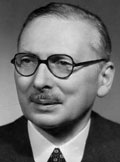 |
René Pleven
b. 15 Apr 1901, Rennes, Ille-et-Vilaine
d. 13 Jan 1993, Paris |
| Title: |
Président du Conseil des ministres (President of the Council of Ministers) |
| Term: |
12 Jul 1950 - 10 Mar 1951 |
| Chronology: |
11 Jul 1950,
endorsed by the vote of investiture, session of the Assemblée nationale (National Assembly), Palais-Bourbon, Paris [1] |
|
12 Jul 1950,
appointed on the list of members of the Council of Ministers, decree of the President of the Republic [2] |
|
10 Mar 1951,
ceased to exercise the functions of office upon the appointment of a successor [3] |
| Term: |
11 Aug 1951 - 20 Jan 1952 |
| Chronology: |
8 Aug 1951,
endorsed by the vote of investiture, session of the Assemblée nationale (National Assembly), Palais-Bourbon, Paris [4] |
|
11 Aug 1951,
appointed on the list of members of the Council of Ministers, decree of the President of the Republic [5] |
|
20 Jan 1952,
ceased to exercise the functions of office upon the appointment of a successor [6] |
| Biography: |
| Son of Jules Pleven, army officer, who taught at the Military Academy of Saint-Cyr (École spéciale militaire de Saint-Cyr); attended public schools at Rennes (until 1911) and Laval (1912-1917); graduated from the faculty of law in Paris (1920); received doctor's degree (1924) and diploma from the Free School of Political Science (École libre des Sciences politiques); editor-in-chief of the Conserverie française (1924-1925); worked for the Blair and Co. Foreign Corp (1926-1929), Paris branch of the U.S. investment company; held executive positions in the European branch of the Automatic Telephone Company (1929-1939) in London; was mobilized (1939) and served in the Air Force; engaged in weapon procurement activities in the U.S.; joined Charles de Gaulle and was made secretary general for the French Equatorial Africa (1940-1941) at Brazzaville, Congo; director of the department for external and economic affairs (1941); was appointed national commissioner for economy, finance and colonies (24 Sep 1941 - 18 Oct 1942) in the French National Committee of the Fighting France (Comité national français de la France combattante); after the reorganisation of the Committee, he served as national commissioner for economy, colonies and merchant navy (28 Jul 1942 - 17 Oct 1942); was appointed national commissioner for foreign affairs and colonies (17 Oct 1942 - 5 Feb 1943); following another reorganisation, served as national commissioner for colonies (5 Feb 1943 - 7 Jun 1943); approved as a member of the French Committee of National Liberation (Comité français de la Libération nationale) (7 Jun 1943 - 3 Jun 1944); commissioner for colonies (7 Jun 1943 - 4 Sep 1944); minister of colonies in the first Provisional Government (4 Sep 1944 - 14 Nov 1944), minister of finance (14 Nov 1944 - 26 Jan 1946); minister of national economy (5 Apr 1945 - 21 Nov 1945); elected a member of the first (1945-1946) and second (1946) Assemblée nationale constituante (Constituent National Assembly), representing Côtes-du-Nord; general councilor for Dinan-Est (1945-1976); was elected to the Assemblée nationale (National Assembly) as a deputy for Côtes-du-Nord (1946-1973); in 1946-1953 president of the Union Démocratique et Socialiste de la Résistance (Democratic and Socialist Union of the Resistance, UDSR), a centrist political party; president of the General Council of Côtes-du-Nord (1948-1976); minister of national defense (28 Oct 1949 - 12 Jul 1950, 8 Mar 1952 - 8 Jan 1953); sponsored the unsuccessful Pleven Plan (1950) for a unified European army, which laid the groundwork for NATO; President of the Council of Ministers (12 Jul 1950 - 10 Mar 1951, 11 Aug 1951 - 20 Jan 1952); Vice-President of the Council of Ministers (10 Mar 1951 - 11 Aug 1951); minister of national defense and armed forces (8 Jan 1953 - 19 Jun 1954); delegate of France to the Common Assembly (1956-1958), European Parliamentary Assembly (1958-1962) and European Parliament (1962-1969); minister of foreign affairs (14 May 1958 - 1 Jun 1958); minister of justice (22 Jun 1969 - 15 Mar 1973).
|
| Biographical sources: "René Pleven: un Français libre en politique", by Christian Bougeard (Rennes: Presses Universitaires de Rennes, 1995). |
| Elections: |
| Vote of investiture (11 Jul 1950) |
| votes cast |
558 |
| constitutional majority |
311 |
| in favour |
373 |
| against |
185 |
| Vote of investiture (8 Aug 1951) |
| votes cast |
493 |
| constitutional majority |
314 |
| in favour |
391 |
| against |
102 |
|
| Source of electoral results: Journal officiel de la République française. Débats parlementaires. Compte rendu in extenso des séances de l'Assemblée nationale et du Conseil de la République. N° 81. Mercredi 12 Juillet 1950. P. 5397-5398; Journal officiel de la République française. Débats parlementaires. Compte rendu in extenso des séances de l'Assemblée nationale et du Conseil de la République. N° 104. Jeudi 9 Août 1951. P. 6280-6281. |
| |
| [1] |
Journal officiel de la République française. Débats parlementaires. Compte rendu in extenso des séances de l'Assemblée nationale et du Conseil de la République. N° 81. Mercredi 12 Juillet 1950. P. 5368-5383. |
| [2] |
Journal officiel de la République française. Lois et Décrets. N° 166. Jeudi 20 Juillet 1950. P. 7563. |
| [3] |
Journal officiel de la République française. Lois et Décrets. N° 61. Dimanche 11 Mars 1951. P. 2642. |
| [4] |
Journal officiel de la République française. Débats parlementaires. Compte rendu in extenso des séances de l'Assemblée nationale et du Conseil de la République. N° 104. Jeudi 9 Août 1951. P. 6252-6275. |
| [5] |
Journal officiel de la République française. Lois et Décrets. N° 188. Samedi 11 Août 1951. P. 8747. |
| [6] |
Journal officiel de la République française. Lois et Décrets. N° 18. Lundi 21 Janvier 1952. P. 915. |

